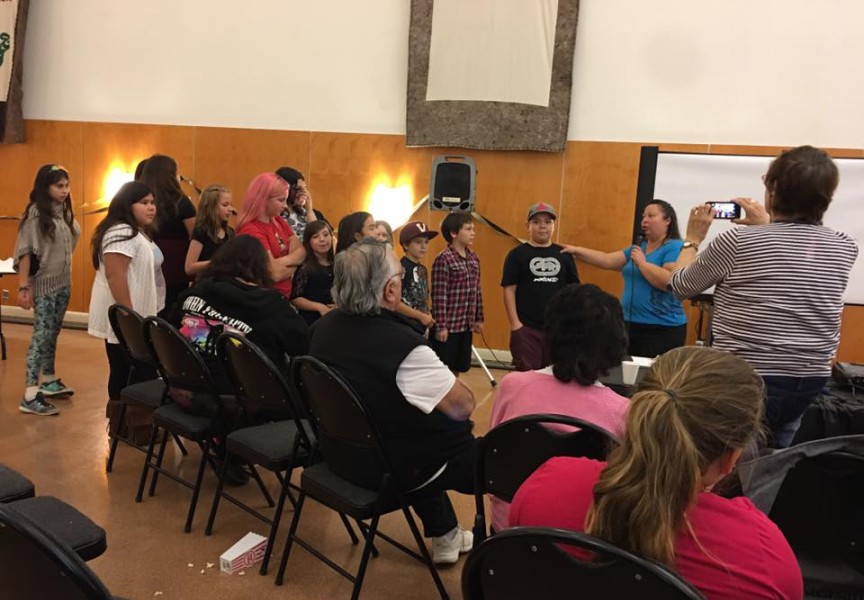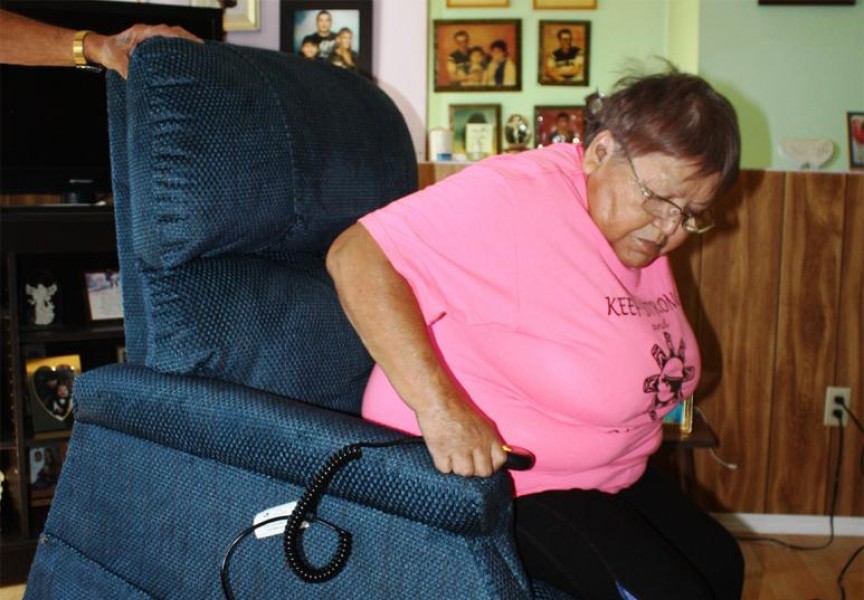Ron Dick said he had no idea why it was so all-fired important that he attend the opening ceremonies for the 2015 Tlu-Piich Games.
“My daughter called me. She said, ‘Dad, you gotta get down to Bob Dailey Stadium. They want you there.’”
When Ron asked her to explain what was going on, she replied, “You’ll find out when you get there.”
At five o’clock, now joined in the bleachers by his equally mystified brother Sid, the emcee announced the latest inductees into the Nuu-chah-nulth Sports Hall of Fame: Ron, Sid and the late James Dick of Tseshaht First Nation.
Out of 10 siblings in the Dick family, it was Ron (born in 1952), James (1960) and Sid (1963) who embraced sports as a way of life. While each was highly skilled on the field in any number of sports, the Hall of Fame induction was as much for their willingness to coach, to organize events and to serve as role models for young athletes coming up. James passed away on March 18 this year, at the age of 54.
Ron said it was another great role model, the late Wahmeesh George Watts, who taught him the value of sports.
“He used to pick all the kids up, to keep them off the street,” Ron said. “At that time, we played floor hockey at the old Sproat School Gym, Monday and Wednesday nights. It wasn’t a very good gym. We played with plastic sticks.”
Those early plastic hockey sticks were pretty flimsy, and didn’t allow an aspiring hockey star to get much velocity on his shot. Ron figured out how to fix that situation.
“We put an insert in the shaft to stiffen it up. We put hardwood inside the tube,” he said. “We played in that gym for two years. Then they built Maht Mahs Gym. It was built for the residential school, but we could use it.”
While both of their parents attended Alberni Indian Residential School, they took steps to ensure their children were spared the nightmare many of their peers lived through.
“I actually had an interview, but they didn’t take me in,” Ron said. “My father had jobs up and down the Coast and my mother worked in the cannery at Kildonan, so I lived with her down there for a while. Then our father got a booming job in Cowichan Bay in Duncan. We moved there and lived there until I was eight or nine. Then we moved back home again. That’s when I started playing sports.”
For Sid, the sports bug didn’t bite until his early teens. By that time, Ron was coaching floor hockey and James was the starting goalie.
“I was just there to watch. But they had no other goalie for practice, so they asked me to try it out. I said, ‘Okay, I’ll try it out.’ So I tried it out, and after that, I just followed my brothers from there.”
They didn’t know it, but the brothers had just set a pattern for life.
“We didn’t have a league, but we played up and down the Island, and in Vancouver at Strathcona Park,” Ron said. “I was coaching the team when [Sid] started. He was actually underage, but I had him playing at 14 as a spare.”
By the time Sid turned 18, he had taken over as the starting goalie with a good bit of playing experience behind him. Over the next four decades, Ron, Sid and James shared their skills and dedication in a full range of sports, with one season overlapping another.
Perhaps their greatest shared passion was for fastpitch. For Ron, the introduction came when his soccer club, the Somass Eagles, evolved into a fastpitch squad, the King Ed’s. The team was very successful, competing in tournaments across the Island, and even took place in the All Native Island Provincials one year.
When Ron launched his own team, best known as the Thunderbirds, it became a Brother Act, with James behind the plate and Sid making the transition from fielder to starting pitcher. As player-coach, Ron took charge on first base.
Sid said he learned how to throw a change-up through a future Hall of Fame pitcher, the late Lanny Ross. His love for the fastpitch game was such that, unlike his older brothers, he never developed a taste for Slo-pitch. As the fastpitch game declined and Slo-pitch took over, he played the game whenever the opportunity presented itself, mainly in tournaments out of town.
“I’m still waiting for fastpitch to come back, but no such luck so far,” he quipped.
But Ron and James made that transition, with Ron coaching a three-generation family team that has evolved into the Somass Guardians. Over the years, the brothers also became involved in organizing and competing in the annual Tlu-Piich Games.
While Ron spent most of his working years in the woods, he spent several years working as a longshoreman, with his late father.
“Most of the longshoremen used to play golf on the weekends, and I went with them. First, I started out as a caddy. Then I started playing with them.”
In his own characteristic fashion, by the time he built up his skills on the course, Ron was already organizing golf tournaments and introducing his brothers to the game.
“When Ron’s company used to have tournaments, he’d invite me to come in,” Sid said.
In one memorable company tournament, Sid, James, Ron and his late stepson, John Watts, took home the winner’s trophy. Ha-Shilth-Sa caught up with Sid just last month when he took part in the Tlu-Piich fundraising tournament at Alberni Golf Club.
Despite his consistent physical activity, when he reached his forties, Ron was diagnosed with Type 2 diabetes, and by his mid-fifties he had gained excess weight and was developing vision problems and numbness in his extremities.
That’s when he added running to his list of activities. Of course, he did it in typical Ron Dick fashion, turning it into a family activity. This year, a team of family members joined him for his sixth Vancouver Sun Run (http://www.hashilthsa.com/news/2015-04-29/tseshaht-senior-beats-type-2-diabetes-diet-and-exercise).
Ron also continues to play Slo-pitch with a passion, even when the weather is downright ridiculous.
“There’s winter tournaments in Nanaimo. They call it Turkey Ball, because it’s so cold. Sometimes you’re playing when it’s snowing and the puddles are two feet deep.”






